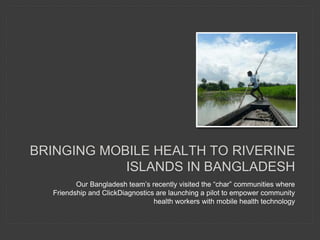Friendship photo essay
- 1. BRINGING MOBILE HEALTH TO RIVERINE ISLANDS IN BANGLADESH Our Bangladesh team’s recently visited the “char” communities where Friendship and ClickDiagnostics are launching a pilot to empower community health workers with mobile health technology
- 2. Bangladesh has hundreds of temporary riverine islands called chars. They are formed by currents carrying silts from upstream, and destroyed by the very same currents every few months or years. For millions of ultra-poor people, settling on these no-man's islands is the only option short from homelessness.
- 3. Homes on the chars are not built to last, since the river inevitability washes away the soil right underneath. More than once a year, families have to abandon their flooded homes and move to another char. Expectedly, there is minimal social service for these temporary communities.
- 4. Friendship, one of ClickDiagnostic's partner organizations has spent immense efforts to understand the geography, ecology, economy, and culture of char communities, in order to design programs tailored to their needs. Currently, Friendship is serving ~300,000 beneficiaries In this picture: Friendship staff showing Dr. Sami, our Bangladesh Country Director a current map of the chars created with the aid of satellite images
- 5. The char health system that Friendship has built has three tiers - hospital ships that provide secondary and tertiary care; biweekly satellite clinics that deliver primary care; and Friendship Community Medics, trained char women going door-to-door to give health advice and dispense basic drugs. In this picture: patients waiting to visit one of Friendship's floating hospitals
- 6. ClickDiagnostics is partnering with Friendship to design and implement mobile health technologies for the chars, so that all tiers of health services become integrated., and Friendship Community Medics can better take care of their communities. In this picture: our CEO Mridul, Bangladesh Program Manager Maya, and Friendship Paramedic Nagma heading to a focus group in a char village
- 7. Friendship Community Medics shared their knowledge of common diseases found in the chars and helped us understand ways mobile technology can make their daily work more effective. In this picture: Dr. Bashar, our Head of Medical Intelligence, listening to Friendship Community Medics during a focus group
- 8. We shadowed a Friendship Community Medic to observe her visits to households and interview the beneficiaries. The residents talked to us about their health conditions, challenges in seeking medical treatment, and services they would want have near their homes. In this picture: Maya chatting with a pregnant young woman and her mother-in-law
- 9. We demoed our maternal health risk screening module for a group of Friendship Community Medics as an introduction to mobile health technology. In this picture: Maya explaining the features of the module to a Friendship Community Medics holding a Click-enabled mobile phone
- 10. Our user interface is written in Bangla for basic java-enabled Nokia phones. The wide-spread data network in Bangladesh allows patient medical data to be transmitted very cheaply to a central server, analyzed by our medical algorithms, and viewed by doctors as needed.
- 11. The ladies were excited about our technology. They learned how to use the software within five minutes, and started testing the features and teaching each other.
- 12. We hope through this partnership, Friendship will further the incredible work it is doing in char communities, so that hundreds of thousands of children and their families can lead healthier, more prosperous lives.












